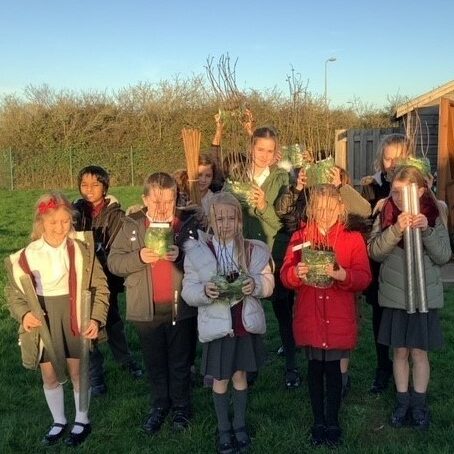Explore the Let’s Go Zero map to see where else teachers, students and school communities are taking action to become zero carbon by 2030.
Let’s Go Zero school action:
Priory Learning Trust, England
Priory Learning Trust started their climate action and sustainability journey by approaching it from a school resource management angle. Knowing they had to report annually their intensity ratio as part of their financial accounts, they focused on how they could reduce their carbon footprint, reduce costs, and make better use of their school resources.
The trust is made up of three secondary schools, one has a sixth form; six primaries one with a speech and language resource base and five with Nurseries / pre-schools. They have been focusing on:
- Reducing waste going to landfill and encouraging a circular economy through pre-loved uniform shops.
- Reducing energy use, not only in the schools but encouraging students and staff to take the message home.
- Looking at various ways the schools’ buildings and grounds can be future proofed to a changing climate.
The Priory Learning Trust is working closely with HEARTs Academy Trust, and jointly they are supporting other schools to share learning and resources through the UKSSN Operations Group. To gain more insight into the work they are both doing and receive some top tips, watch their webinar here.
Read some highlights from The Priory Learning Trust below.

The teachers and students leading the action:
“Just be brave and take that first step and go for it. Take a first step and then there will be a second and a third. And then before you know it, you’ve made progress. But if you haven’t started, it’s never too late to start.”
Helen Burge, Deputy Chief Operations Officer

What are they doing in their school?

By looking into their various waste management contracts, the trust has been able to see what is being recycled and what is going to landfill across its different schools. This research has involved visiting recycling centres and incinerators, sparking conversations around what the students can do to reduce waste.
Working with their catering provider they have removed single used plastic, which is estimated to be just over 95,000 single use plastic bottles in one year across the three secondaries. Food waste generated in the kitchen is now being measured and analysed to understand the production, plate and counter waste composition. Menus are being reconsidered to reduce all three types of waste. Pre-loved school uniform sales are being promoted in all their schools. In their secondary schools and sixth form, prom dresses and suits are also included in these sales. As part of the trust’s initiative to reduce textile waste, students can borrow suits for job interviews, work experience or apprenticeships. Secondary school students are also given reuseable water bottles, with water fountains found around their schools site to reduce single use plastic waste.

Priory Learning Trust have started including more plant-based food options on their school menus. By introducing these options gradually and making sure the food is healthy and tasty, they believe there has been an overall shift in culture and staff and students are more accepting of these food options.

The trust believes that they need to encourage sustainable behaviour change not just within the school buildings but in their staff and students lives. Their messaging around energy is one that can be taken home. The energy saving behaviours learnt in school to save the trust money on energy bills can also support the students and staff in their own homes. The trust uses Energy Sparks to monitor energy data, their implemented changes is often seen in the data.
Staff receive discounts for energy efficiency measures through their employee assistance platform and are given information about things they can do around their homes to keep warm while keeping bills down.
The energy efficiency funding schools received in autumn 2022 was used to remove two oil boilers from two small primary schools. They also used the money to install an air conditioning unit and put solar panels on the roof. So, on hot days they can keep the schools cool through their new solar panels, future-proofing their buildings against hotter weather.
The kitchen staff have also been brought along on the journey, doing a kitchen energy audit, looking at how energy efficient their equipment is and adjusting operation times to be more efficient.
The trust has also been looking into LED lighting, double glazing, insulation and conducting BMS surveys across all their schools.
Since reporting in 2018/19 the trust’s intensity ratio in the year end accounts, they have reduced this by 88% in 3 years mostly by procuring green electricity and the measures listed above. They are hopeful that next year’s intensity ratio per pupil will be even lower because they removed oil as an energy source in August 2023.

The trust wants to increase and improve the biodiversity within their school grounds. By repurposing areas of the school’s grounds into a pollinating meadow area, they have not only improved biodiversity, but saved money as it now only needs mowing twice a year.
They are also conscious that their school grounds need to adapt to the changing climate by having more shade during hot weather and allowing the grounds to absorb more water as risk of flooding increases. The schools are coastally located and at high risk of flooding, so minimising this risk for the wider community is very important to the trust.

Through looking at the trust’s resource management, conversationd have started with suppliers, and the trust has begun to hold them accountable in terms of sustainability. This is helping to prove to suppliers that the demand from consumers is there and that if they want their businesses to be competitive in the future, they will need to have environmental commitments.

The Priory Learning Trust want to look at their curriculum and how it can reflect the actions the trust is taking i become more sustainable and climate conscious.

Students at their various schools have been taking part in the Eco-Schools programme and ModeShift STARS. Empowering their students to take action ac make sustainable changes around their schools and local communities is one of the trust’s key priorities.